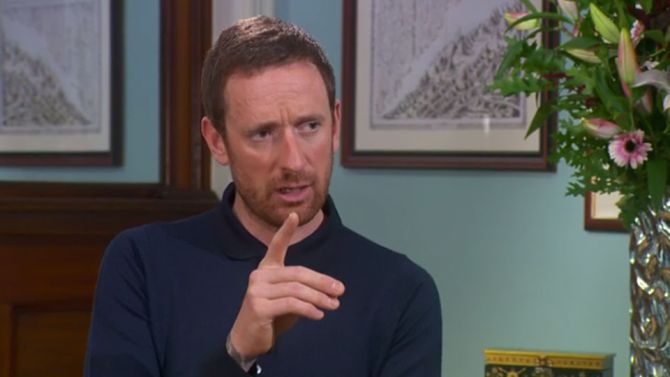UKAD pushing for blanket ban on drug used by Wiggins
Anti doping body has also called for tramadol ban

The UK Anti Doping Agency (UKAD) have confirmed they've been lobbying the World Anti Doping Agency (WADA) for three years to introduce a blanket ban of the drug used by Bradley Wiggins – triamcinolone acetonide – and other such glucocorticoids.
They have also pushed for a ban on tramadol, the powerful painkiller that riders have claimed has been used both at British Cycling and at Team Sky.
Glucocorticoids are banned in competition under WADA rules, though athletes can take them if they avail of a Therapeutic Use Exemption (TUE), as Wiggins did with triamcinolone ahead of the 2011 and 2012 Tours de France and the 2013 Giro d'Italia. They are not, however, banned outside of competition.
UKAD confirmed to Cyclingnews on Thursday that for the last three years they have called for a complete blanket ban on glucocorticoids as part of WADA's annual consultation process that precedes the publication of its banned list.
Some former dopers have attested to the performance enhancing qualities of triamcinolone, and UKAD cite glucocorticoids' weight loss properties – with power to weight ratio a crucial tenet of cycling performance – in calling for an out-of-competition ban.
"UKAD has raised concerns in its submissions for the last three years about the potential misuse of glucocorticoids out-of-competition, primarily to assist with weight loss," read a statement sent to Cyclingnews on Thursday.
"An athlete's power-to-weight ratio and weight management are important factors that contribute to success in weight bearing endurance sports and weight classification sports, respectively. We continue to encourage the WADA List Expert Group to reconsider the status of the systemic use of glucocorticoids on the List, particularly in endurance and weight classification sports. We have also provided suggestions on how to improve the effectiveness of monitoring for patterns of out-of-competition use should further evidence be required before WADA review their position."
Get The Leadout Newsletter
The latest race content, interviews, features, reviews and expert buying guides, direct to your inbox!
Wiggins has come under fire in recent weeks for his use of triamcinolone acetonide, which he says he needed to treat asthma and allergy issues. No anti-doping rules were broken by him or Team Sky, but he has faced scrutiny over the timing of the injections, the veracity of his medical need for such a powerful drug, and his stance on needles, having previously claimed he'd never had an injection – apart from routine vaccinations or IV drips.
Sky have also faced pressure over their stance on TUEs, whether they have sought to exploit the supposed 'grey area' they allow for, and the implications that all has on their self-styled identity as a demonstrably clean and transparent team.
Tramadol
UKAD have also expressed their concerns over Tramadol, another drug that has brought controversy to the Team Sky doorstep, along with other opium based narcotics.
The Movement for Clean Cycling (MPCC) and others have called for tramadol to be banned in the past but it remains on WADA's 'watch list' – monitored but still permitted – for 2017.
The issue surfaced for Sky a couple of years ago when former rider Michael Barry claimed the use of Tramadol was widespread in the team. He said the drug, which numbs pain and also heightens the risk of crashes due to symptoms of drowsiness, was "as performance-enhancing as any banned drug I had taken".
The controversy extended to British Cycling last week when Jonathan Tiernan-Locke, a former Sky rider who has served a doping ban, claimed that tramadol was offered 'freely around' the Great Britain team at the 2012 Road World Championships.
"Pain has a negative effect on performance and is a contributor to the sensation of fatigue. Consequently, increasing an individual's pain tolerance has the potential to be performance enhancing," read UKAD's stance on narcotics, which calls for further research and greater consistency over which substances are banned.
"A relevant example of this is tramadol, for which there has been extensive media coverage and evidence to support its prevalence."
UKAD's statements raise more uncomfortable questions for Team Sky and British Cycling over the potential disparity between their practices and the stance of their home National Anti Doping Organisation (NADO). In drawing up its recommendations during WADA's consultation process, UKAD liaises directly with sports federations such as British Cycling, along with other sporting stakeholders.
Wiggins' use of triamcinolone acetonide does, however, predate UKAD's calls for a blanket ban on glucocorticoids, with his last injection coming in 2013. UKAD first raised its concerns over tramadol to WADA in 2015, predating the allegations made by Tiernan-Locke and Barry.
Patrick is a freelance sports writer and editor. He’s an NCTJ-accredited journalist with a bachelor’s degree in modern languages (French and Spanish). Patrick worked full-time at Cyclingnews for eight years between 2015 and 2023, latterly as Deputy Editor.
